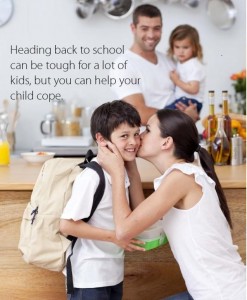School starting in the next couple of weeks can be stressful for both kids and parents. Transitioning from the relaxed summer schedule into the hectic, activity filled school year can bring out a variety of emotions ranging from anxiety to excitement. With some planning and insight, easing back into the routine of school does not have to be a stressful time for your family.
First, change can be a trigger. Change of routine and environment can bring about anxiety and nervousness in children. In some cases, the change can be substantial enough to bring out the first signs of a mental health condition or amplify existing symptoms. Help your child find healthy ways to manage their emotions surrounding the new school year.
You are your child’s first resource
Be and stay available for your children. Try to incorporate uninterrupted time where you are free from distractions to be both physically and emotionally available to your child. Your child knows when you are distracted and they will appreciate having your genuine interest with an open ear at the end of each school day. In the car or over dinner are great times to communicate and bond. Additionally general observations, expressing curiosity or concern is a great way to start the conversation: “I’ve noticed that you have been quiet lately… You can talk to me about anything, I am here to listen.” Remember do not assume you know your child’s thoughts or struggles before you ask them. Even if your assumptions are correct, the act of asking shows that you are genially interested and open to talk.
One of the hardest parts about having a growing child is staying connected. The older a kid get the less they share with parents. However, this does not mean you should be less aware of their feelings and concerns. Be persistent, even if your child protests and continue to make connecting apart of your daily routine. Find creative ways to show your child that you are available and care about them even if you are not always physically present with them. For example sending a text or slip a note in their lunch can ease your child’s anxiety and let them know they are not alone.
When your child does come to you, listen and be willing to discuss the experiences that are challenging or uncomfortable. If there is a problem do not immediately jump to the solution. Take the time to ask about and acknowledge all your child’s emotions about the situation. Ask your child if they have ideas to make the situation better. Problem solving should be a collaborative effort. Ask your child how you can help and what role do they see you, a parent, playing in the solution. Your child might want you very involved or to handle things on their own.
Taking care of yourself
Pay attention to your own emotions when you are talking to your child. Listening to your child’s concerns or struggles can be triggering sometimes. If you find yourself becoming overwhelmed, upset or losing clarity then remove yourself from the situation and take a time out. You are modeling self-care to your child and do not worry how this looks to them.
Similarly, parents are great advice givers but sometimes we need advice ourselves. Build a support network for yourself of friends, family, members of the community and healthcare resources that you feel comfortable with. Take advantage of and ask you support network for help when you need it. Additionally take time for yourself to rest and relax. All of these things will help you to help your child through their tough times.
Connecting with resources
Knowing where and how to connect with resources for help is a major key to success that can be utilized starting at an early age. Resources of help can be for temporary support or more long term substantial support. Regardless of the type of issues, your child is facing, let them know there are people wanting and waiting to get involved for any variety of issues they may be facing. Help your child connect with resources and support systems they may need like Tutors; Guidance counselors; Principals and teachers; Mentors; and Therapist. Over time the support your child receives can provide great gains for their personal success.
Creating good coping skills and habits
The ways in which your child learns to cope during difficult times can carry over into their adult lives. The longer a person uses a coping mechanism the harder it is to be changed. Early on, children need to be taught healthy ways to cope in order to help combat the variety of negative coping methods that will become available to them. Help your kid develop healthy habits that will give them a fighting chance into adolescence and onto adulthood. Give your child strategies to cope and manage stress like talking to a trusted confidante, journaling, exercising, listening to music, or learning a new skill. Also get your child evolved in activities outside of their school.
 Similarly, teach your child that it is okay to make mistakes and talk with them to change their viewpoints of failure. Children feel pressure to never mess up or fail, but those experiences are a part of life. It is inevitable that your child will make mistakes and have setbacks. Teach them to look at failure and mistakes as lessons learned on the way to success. With this viewpoint their possibilities and potential in life become limitless and hurt from failure and mistakes is only temporary.
Similarly, teach your child that it is okay to make mistakes and talk with them to change their viewpoints of failure. Children feel pressure to never mess up or fail, but those experiences are a part of life. It is inevitable that your child will make mistakes and have setbacks. Teach them to look at failure and mistakes as lessons learned on the way to success. With this viewpoint their possibilities and potential in life become limitless and hurt from failure and mistakes is only temporary.
Another healthy habit to start young with your child is making sure they get enough sleep. Our children’s brains grow and develop all the way into their 20s. Getting enough sleep helps the brain to develop while allowing a person to retain more information and have overall better health. Getting enough sleep is also show to prevent the onset of depression and other mental health conditions that can manifest themselves during adolescence. Establish a practical bedtime routine for your children and discuss with them the importance of sleep hygiene.
Similarly, food choices affect mood, ability to concentrate and energy level – all key in your child’s academic success and overall well-being. Providing healthy foods is important for your child’s mental and physical health. Serve a variety of foods, including vegetables, fruits, and whole grains. Equally important, physical activity is great for mental wellness and has been shown to decrease depression and anxiety. Experts believe that exercise releases chemicals in our brains that make us feel good. Regular exercise can also boost your child’s self-esteem and help them concentrate, sleep, and feel better. Help your child find types of exercise they enjoy, and try to be active together.
Creating a mental health plan
For children that already have a diagnosed mental health condition, it is important to establish support before the school year starts. Talk to your child’s mental health professional to determine what kinds of resources are available. Have regular check-ins with your child and their care team to monitor any changes. Additionally, try to normalize mental health care as a part of your child’s life rather than solely focusing on or isolating the mental health disorder.
Similarly, mental-health conditions can create major barriers to learning. As parents, we can provide support in our child’s recovery and help them as they work to integrate back into school and continue on with life. Navigating mental health and your child’s education can be a tricky thing, but the following are few points to consider.
Teachers may not have in-depth mental health training and may not be familiar with the particulars of your child’s condition. This raises the question of how might the disclosure of a mental illness affect all aspects of your child’s relationships in school? However, it is important to develop a plan particular to your family so your child feels supported at school. Giving your child’s teacher insight to your child’s condition can help the teacher create a safe and positive environment for your child where they feel included with their peers.
The entire endeavor of sending a child to school with a mental health condition can seem beyond our capacity as parents, but it’s not. We have to create a coalition of educators, mental health professionals, and family to surround the issues collectively. Additionally, as parents, we need research and guide effective back-to-school transitions, interventions, and support. Our children deserve it, and if we are to keep them healthy and in school engaged and thriving, then we have to create a plan.

